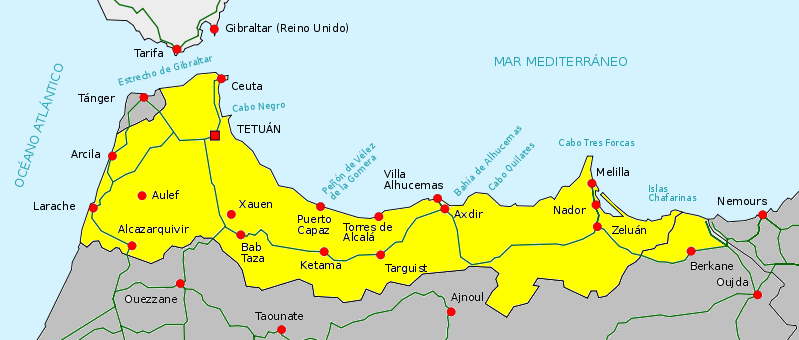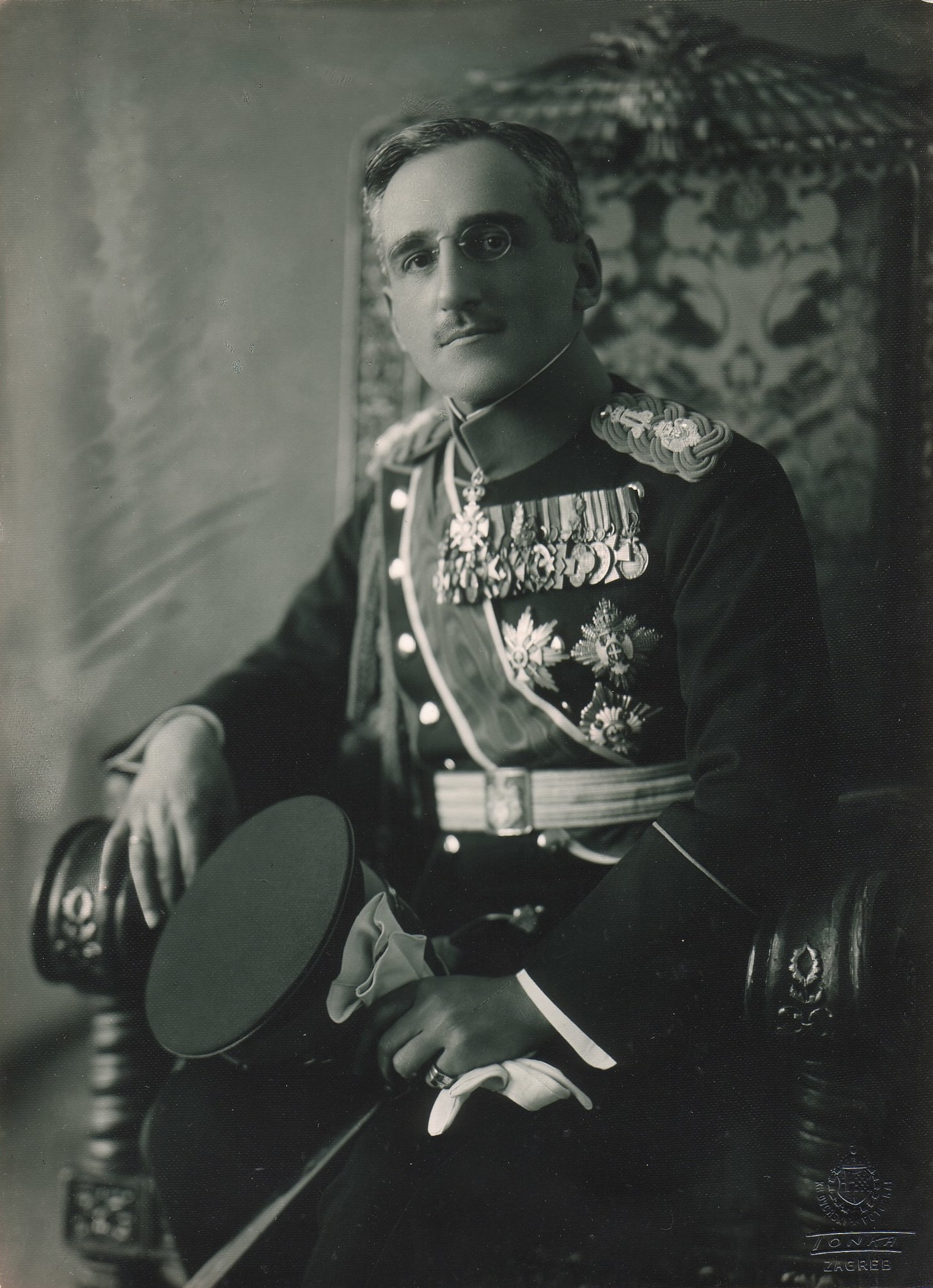|
Francoism
Francoist Spain (), also known as the Francoist dictatorship (), or Nationalist Spain () was the period of Spanish history between 1936 and 1975, when Francisco Franco ruled Spain after the Spanish Civil War with the title . After his death in 1975, Spain transitioned into a democracy. During Franco's rule, Spain was officially known as the Spanish State (). The informal term "Fascist Spain" is also used, especially before and during World War II. During its existence, the nature of the regime evolved and changed. Months after the start of the Civil War in July 1936, Franco emerged as the dominant rebel military leader and he was proclaimed head of state on 1 October 1936, ruling a dictatorship over the territory which was controlled by the Nationalist faction. The 1937 Unification Decree, which merged all of the parties which supported the rebel side, led to Nationalist Spain becoming a single-party regime under the FET y de las JONS. The end of the Civil War in 1939 brou ... [...More Info...] [...Related Items...] OR: [Wikipedia] [Google] [Baidu] |
Totalitarianism
Totalitarianism is a political system and a form of government that prohibits opposition from political parties, disregards and outlaws the political claims of individual and group opposition to the state, and completely controls the public sphere and the private sphere of society. In the field of political science, totalitarianism is the extreme form of authoritarianism, wherein all socio-political power is held by a dictator. This figure controls the national politics and peoples of the nation with continual propaganda campaigns that are broadcast by state-controlled and state-aligned private mass communications media. The totalitarian government uses ideology to control most aspects of human life, such as the political economy of the country, the system of education, the arts, sciences, and private morality of its citizens. In the exercise of socio-political power, the difference between a totalitarian regime of government and an authoritarian regime of government is ... [...More Info...] [...Related Items...] OR: [Wikipedia] [Google] [Baidu] |
Francisco Franco
Francisco Franco Bahamonde (born Francisco Paulino Hermenegildo Teódulo Franco Bahamonde; 4 December 1892 – 20 November 1975) was a Spanish general and dictator who led the Nationalist faction (Spanish Civil War), Nationalist forces in overthrowing the Second Spanish Republic during the Spanish Civil War and thereafter ruled over Spain from 1939 to 1975, assuming the title ''Caudillo''. This period in Spanish history, from the Nationalist victory to Franco's death, is commonly known as Francoist Spain or as the Francoist dictatorship. Born in Ferrol, Spain, Ferrol, Galicia, into an upper-class military family, Franco served in the Spanish Army as a cadet in the Toledo Infantry Academy from 1907 to 1910. While serving in Spanish protectorate in Morocco, Morocco, he rose through the ranks to become a brigadier general in 1926 at age 33. Two years later, Franco became the director of the General Military Academy in Zaragoza. As a Conservatism, conservative and Monarchism, ... [...More Info...] [...Related Items...] OR: [Wikipedia] [Google] [Baidu] |
Una, Grande Y Libre
The mottos of Francoism are mottos which encapsulate the ideals of the Francoist dictatorship. Although the regime had many ideological influences (Traditionalism, National Catholicism, Militarism and National syndicalism), it employed Falangism in its popular movements. Falangist ideology was easily incorporated in the creation of mottos as it is believed to demonstrate a certain reluctance towards political agendas, and to favour empiricism, taking action, and the simplification of ideas. Although these mottos originated from the activity of different right-wing intellectuals and nationalist political parties during the Second Spanish Republic, their use became widespread and proved to be an effective propaganda tool used by the Nationalist faction during the Spanish Civil War (1936–1939) in mobilising public opinion and persuading the population to conform to nationalist ideas. Mottos were also often used as political chants during Franco's dictatorship (1939–1975). As ... [...More Info...] [...Related Items...] OR: [Wikipedia] [Google] [Baidu] |
National Catholicism
National Catholicism ( Spanish: ''nacionalcatolicismo'') was part of the ideological identity of Francoism, the political system through which the Spanish dictator Francisco Franco governed the Spanish State between 1939 and 1975. Its most visible manifestation was the hegemony that the Catholic Church had in all aspects of public and private life. As a symbol of the ideological divisions within Francoism, it can be contrasted to national syndicalism (Spanish: ''nacionalsindicalismo''), an essential component of the ideology and political practice of the Falangists. History The invention of the term is attributed to the Jesuit and historian Alfonso Álvarez Bolado, who gave the term a scientific nuance and whose articles were compiled by the publishing house Cuadernos para el Diálogo in 1976, before, the term was used more informally. In France, a similar model of National Catholicism was advanced by the Fédération Nationale Catholique formed by General Édouard Caste ... [...More Info...] [...Related Items...] OR: [Wikipedia] [Google] [Baidu] |
One-party
A one-party state, single-party state, one-party system or single-party system is a governance structure in which only a single political party controls the ruling system. In a one-party state, all opposition parties are either outlawed or enjoy limited and controlled participation in elections. The term "''de facto'' one-party state" is sometimes used to describe a dominant-party system that, unlike a one-party state, allows (at least nominally) multiparty elections, but the existing practices or balance of political power effectively prevent the opposition from winning power. Membership in the ruling party tends to be relatively small compared to the population. Rather, they give out private goods to fellow elites to ensure continued support. One-party, compared to dominant-party dictatorships, structure themselves unlike democracies. They also turn into multi-party democracies at a lower rate than dominant-party dictatorships. While one-party states prohibit opposition p ... [...More Info...] [...Related Items...] OR: [Wikipedia] [Google] [Baidu] |
Tangier International Zone
The Tangier International Zone (; ; ) was a international zone centered on the city of Tangier, Morocco, which existed from 1925 until its reintegration into independent Morocco in 1956, with interruption during the Spanish occupation of Tangier (1940–1945), and special economic status extended until early 1960. Surrounded on the land side by the Spanish protectorate in Morocco, it was governed under a unique and complex system that involved several European nations, the United States (mainly after 1945), and the Sultan of Morocco, himself under a French protectorate in Morocco, French protectorate. Due to its status as an international zone, Tangier played a crucial role for Moroccan nationalists, who wanted independence, to establish international contacts and recruit allies as well as organising gatherings and events. Background: early international governance in Tangier For nearly a century after the end of English Tangier, English rule in 1684, Tangier was primarily ... [...More Info...] [...Related Items...] OR: [Wikipedia] [Google] [Baidu] |
Authoritarian Conservatism
Authoritarian conservatism is a political ideology that seeks to uphold Social order, order, tradition and Social stratification, hierarchy, often with forcible suppression of radical and revolutionary enemies such as Communism, communists, Nazism, Nazis, and Anarchism, anarchists. Authoritarian conservative movements and regimes have included Chiangism in China, Metaxism in Greece, Putinism in Russia, and Francoism in Spain. Although the concept of authority has been identified as a core tenet of conservatism in general, authoritarian conservatism is only one of Conservatism#Ideological variants, many different forms of conservatism. It is contrasted with libertarian conservatism, which has been the most common form of conservatism in the United States. Ideology Historical roots The two philosophical forefathers of conservatism, Edmund Burke and Joseph de Maistre, inspired two separate forms of conservatism. Whereas the first was rooted in a more libertarian Whigs (British p ... [...More Info...] [...Related Items...] OR: [Wikipedia] [Google] [Baidu] |
Unitary State
A unitary state is a (Sovereign state, sovereign) State (polity), state governed as a single entity in which the central government is the supreme authority. The central government may create or abolish administrative divisions (sub-national or sub-state units). Such units exercise only the powers that the central government chooses to delegate. Although Power (social and political), political power may be delegated through devolution to regional or local governments by statute, the central government may alter the statute, to override the decisions of Devolution, devolved governments or expand their powers. The modern unitary state concept originated in France; in the aftermath of the Hundred Years' War, national feelings that emerged from the war unified France. The war accelerated the process of transforming France from a feudal monarchy to a unitary state. The French people, French then later spread unitary states by conquests, throughout Europe during and after the Napoleoni ... [...More Info...] [...Related Items...] OR: [Wikipedia] [Google] [Baidu] |
Alejandro Rodríguez De Valcárcel
Alejandro Rodríguez de Valcárcel y Nebreda (25 December 1917 – 22 October 1976) was a Spanish falangist politician and State lawyer, who served in important positions during the dictatorship of Francisco Franco. Biography Born in December 1917 in Burgos to a bourgeois family, he joined the Sindicato Español Universitario (SEU) in 1934. A ''camisa vieja'' Falangist, he entered the Civil War as volunteer in a ''Bandera'' of Falange. From 27 November 1969 to 5 December 1975 he served as the President of the Francoist Cortes. He was a chief endorser of the (ANEPA). In the capacity of President of the Council of Regency, he briefly served as acting Head of State, from Franco's death on 20 November to 22 November 1975, when then Prince Juan Carlos took an oath and was proclaimed King of Spain The monarchy of Spain or Spanish monarchy () is the constitutional form of government of Spain. It consists of a Hereditary monarchy, hereditary monarch who reigns as the ... [...More Info...] [...Related Items...] OR: [Wikipedia] [Google] [Baidu] |
Caudillo
A ''caudillo'' ( , ; , from Latin language, Latin , diminutive of ''caput'' "head") is a type of Personalist dictatorship, personalist leader wielding military and political power. There is no precise English translation for the term, though it is often used interchangeably with "Military dictatorship, military dictator," "warlord" and "Political strongman, strongman". The term is historically associated with Spain and Hispanic America, after virtually all of the regions in the latter won independence in the early nineteenth century. The roots of ''caudillismo'' may be tied to the framework of rule in medieval and early modern Spain during the Reconquista from the Moors. Spanish conquistadors such as Hernán Cortés and Francisco Pizarro exhibit characteristics of the ''caudillo'', being successful military leaders, having mutual reliance on the leader and their supporters, and rewarding them for their loyalty.Hamill, Hugh M. (1996) "Caudillismo, Caudillo" in ''Encyclopedia of L ... [...More Info...] [...Related Items...] OR: [Wikipedia] [Google] [Baidu] |
List Of Heads Of State Of Spain
This is a list of Spanish Head of state, heads of state, that is, kings and presidents that governed the country of Spain in the modern sense of the word. The forerunners of the Monarchy of Spain, Spanish throne were the following: * Kings of Asturias * Kings of Navarre * Kings of León * Kings of Galicia * Kings of Aragon * Kings of Castile These lineages were eventually united by the marriage of the Catholic Monarchs, Ferdinand II of Aragon (king of the Crown of Aragon) and Isabella I of Castile (queen of the Crown of Castile). Although their kingdoms continued to be separate, with their personal union they ruled them together as one dominion. Spain was thereafter governed as a dynastic union by the House of Trastámara, the House of Habsburg, and the House of Bourbon until the Nueva Planta decrees merged Castile and Aragon into one kingdom. During the First Spanish Republic (1873–1874), Spain had heads of state known as the ''President of the Executive Power''. However, ... [...More Info...] [...Related Items...] OR: [Wikipedia] [Google] [Baidu] |








